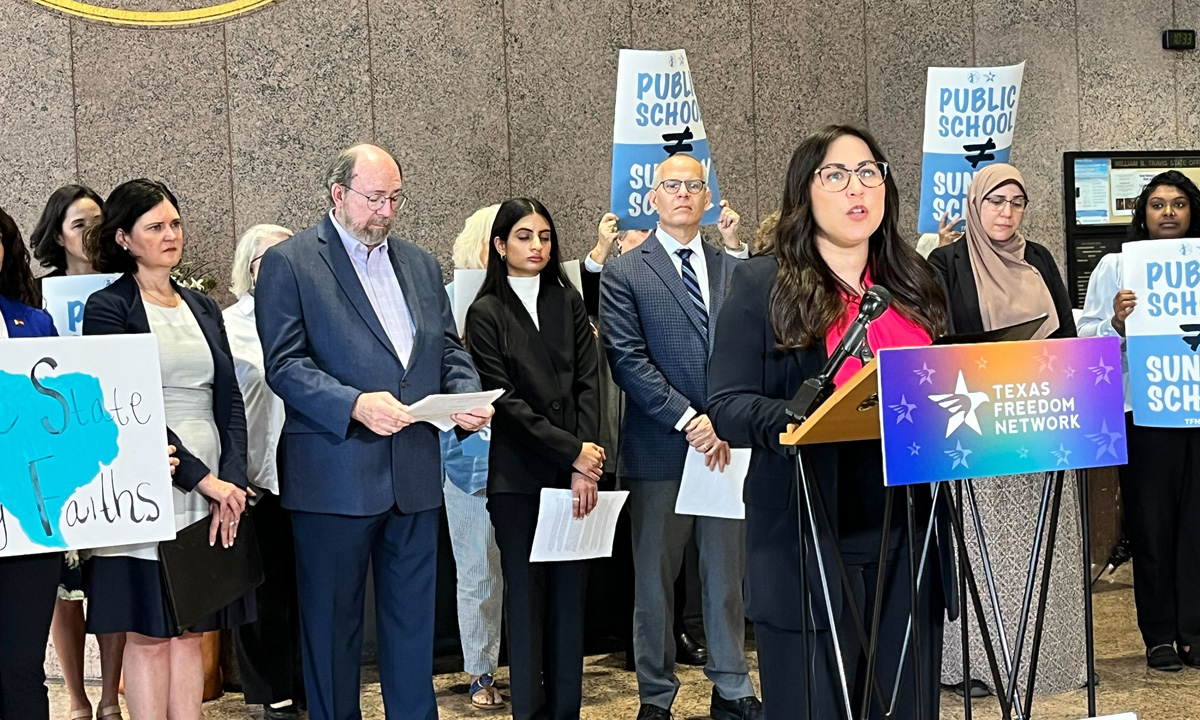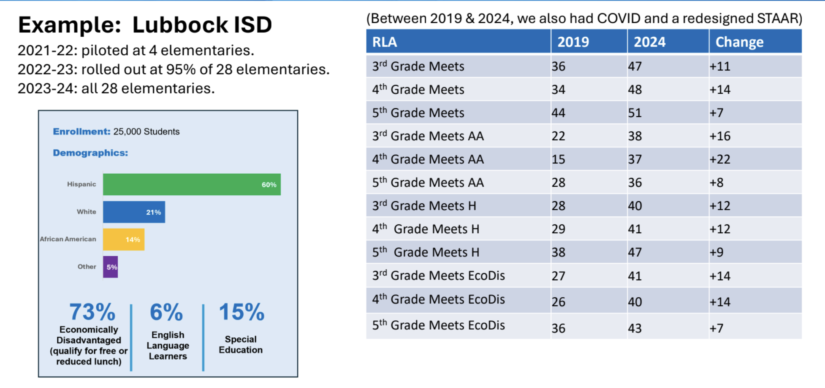Texas Jews Say State’s New Bible-Influenced Curriculum Is ‘Wildly Problematic’
The state board heard hours of testimony Tuesday, highlighting the intense debate over a curriculum that includes multiple stories from the Bible.

Get stories like this delivered straight to your inbox. Sign up for The 74 Newsletter
The portrayal of Jewish people became a main point of contention Tuesday during a state school board hearing about Texas’s new reading curriculum that predominantly features the Bible and Christianity over other faiths.
During several hours of public testimony before the State Board of Education, multiple speakers noted negative or inaccurate representations of Judaism and a lack of attention to contemporary Jewish life or Americans.
Sharyn Vane, one of the speakers who addressed the board, called the new program, branded as Bluebonnet Learning, “wildly problematic in its depictions of Jews and Judaism.” She referred to a second grade lesson on Queen Esther in which Haman, an official of the Persian king, cast lots to decide when to kill the Jews. The lesson includes students playing a game of dice. “This is shocking, offensive and just plain wrong. Do we ask elementary schoolers to pretend to be Hitler?”
Another speaker pointed to how fourth graders are asked to highlight positive aspects of the Crusades.
“We were being murdered en masse,” Emily Bourgeois, public affairs director for Shalom Austin, said about the persecution of Jews during the Middle Ages. “There’s not really a whole lot of benefit to that.”
The public’s comments, while more critical than favorable, demonstrated the intense pressure on board members to either tone down the emphasis on the Bible, add more references to other world religions or accept the proposed curriculum as is. The Texas Education Agency, which developed it, now has until Oct. 14 to complete any revisions before the board votes in November on a final list of approved materials. Groups opposed to the biblical content have urged the board to reject lessons that they say come close to proselytizing. But conservative organizations, especially religious ones, have encouraged their networks in recent weeks to bombard members with emails calling for approval of the state-developed materials with no changes.
”The Bible is the single most impactful piece of literature. It is the single biggest influence on the formation of Western civilization,” Aaron Harris, a political consultant who has been countering opposition to the materials, said during the hearing. “Any denial of that fact is just silly.”
Some board members seem to have already made up their minds. In her summer newsletter, Audrey Young, a Republican whose district includes Houston, said not including the Bible in the curriculum will “continue to severely limit [students’] opportunity for academic success.”
“Separation of church and state as a legal concept does not mean the two realms never interact,” she wrote. “It only means that one does not control the other.”
Julie Pickren, a conservative Republican board member — who often posts Bible verses on social media — defended the Bluebonnet Learning curriculum throughout the meeting, saying she’s received 12,000 emails in favor of the program, but just a “minuscule” number opposed.
‘Y’all must have done something right,” she told Colin Dempsey, a director at the agency that has managed the review process.
Others, however, are still probing for information on who influenced the development of the curriculum, which was adapted from Core Knowledge Language Arts, a widely used reading program published by Amplify. At least twice, Board Member Pam Little, also a Republican, asked whether the agency engaged a religious committee to provide input on the lessons.
The state has posted a list of the members of the advisory committee. But a spokesman for the agency said he was unaware of a separate group of faith leaders who were involved in the process.
One group involved in the development of the materials — and now promoting them — is the Texas Public Policy Foundation, a right-leaning organization. Two experts with the foundation, Thomas Lindsay and Courtnie Bagley, worked as “subject matter experts” on the lessons. Lindsay was also on the advisory board. The group’s involvement has spurred some critics to raise questions about whether improving reading scores is the primary objective of the new curriculum.
“Gov. Greg Abbott’s education commissioner is outsourcing the education of a generation of Texas school children to people more interested in pushing political agendas than in educating kids,” Carisa Lopez, deputy director of the Texas Freedom Network, said during a press conference Tuesday. “That should be alarming to all parents regardless of their religious or political beliefs.”
Last month, the watchdog group, which monitors far-right movements, issued a report on the curriculum, saying the authors present Christian beliefs as “straightforwardly true.” Author David Brockman, a religious studies scholar at Rice University, cited, for example, a third grade lesson on Christianity that states, “In the years that followed, many heard about the resurrection of Jesus.”
“Students may well gain the impression that the Resurrection was a historical event — a faith claim a public school curriculum has no business conveying,” Brockman wrote.
State officials, meanwhile, have already accepted many of the corrections submitted by the public, according to a report now posted on the agency’s website. Mark Chancey, a religious studies professor at Southern Methodist University, submitted dozens of corrections. The state revised, for example, a line that said the word “genesis” originated with the first book of the Bible. But they made no changes to the statement: “God gave King Solomon wisdom on all things.” Chancey commented that the wording promotes “a particular religious belief.”

‘A position of authority’
Bluebonnet Learning, which will be optional for districts to use, is just one of 142 programs in reading and math publishers submitted to the board. The fact that Tuesday’s speakers exclusively spoke about Bluebonnet highlights the intense controversy the Bible-infused curriculum has ignited since late May when the agency released it.
Expecting the polarizing comments, Board Chair Aaron Kinsey asked Austin Kinghorn, a deputy state attorney general, to weigh in on the constitutionality of the curriculum. Kinghorn asserted, as most supporters of the curriculum have, that it’s permissible to teach about religion in public school and that the Bible played a pivotal role in American history. But if lessons amount to proselytizing, he said, they would violate the First Amendment.
Multiple times, he noted the U.S. Supreme Court’s 2022 decision in Kennedy v. Bremerton School District, in which the court upheld a high school coach’s right to pray in public at football games, as the most recent legal test of whether references to religion in school cross the line. Coercion, he said “doesn’t exist nearly as often” as some perceive.
But other legal experts said the Kennedy decision doesn’t necessarily answer the questions raised by the Texas curriculum, or similar actions in other GOP-led states. In Oklahoma, state Superintendent Ryan Walters has mandated that teachers use the Bible in instruction, and in Louisiana, a new law requires the 10 Commandments posted in all classrooms.
“The entire premise of the Kennedy ruling is that the coach was not acting from a position of authority, but was acting solely in his private capacity and that those who joined him in his private prayer did so voluntarily,“ said Derek Black, a constitutional law professor at the University of South Carolina. Schools can “expose students to portions of the Bible as an example of literature or religious text, as long as it is in the context of exposure to lots of other historical literature. But they cannot teach the Bible as religion or truths that someone should or should not follow.”
‘World religions’
High-level debates over what children learn are nothing new in Texas.
About a decade ago, the state discontinued use of an online curriculum system, called CSCOPE, after conservatives complained it was anti-American. The majority of districts in the state used the materials, but some critics didn’t like that lessons introduced students to other world religions, like Islam.
A similar controversy derailed plans in 2022 to adopt a new social studies curriculum. Republican lawmakers argued the material would violate the state’s law against teaching “critical race theory” because it included lessons on race and LGBTQ issues, among other topics.
For reading, the state spent $19 million in 2020 to purchase the Amplify program. At the time, the state rejected two of the units Amplify submitted that covered the world’s major religions. As The 74 first reported, the state asked Amplify to add some stories from the Bible, like the one on Queen Esther. The company wrote a draft, but it ultimately bowed out and didn’t bid on the next phase of the project
In 2022, the state contracted with Boston-based Public Consulting Group to further revise the Amplify lessons. Notes from an April 2022 “project kick-off meeting,” which the Texas Education Agency shared with The 74, show officials planned to “bring world religions back in.” Another notation said a second grade unit on ancient Greece, which focuses on mythology, would be a “form of teaching other religion.”
The proposed materials, however, include sparse mentions of Islam and Hinduism while predominantly featuring stories and passages from the Bible. And religions like Sikhism aren’t mentioned at all.
That lack of representation “takes away the opportunity for students to develop a genuine understanding of practices and perspectives outside their own,” Upneet Kaur, senior education manager for The Sikh Coalition, told the board. “Sikh students know the devastating impact of this all too well.”
But Carole Haynes, one of the nearly 250 reviewers the state hired to examine the proposed materials, wrote in a recent op-ed that countries where other religions are dominant are unlikely to “allow Christianity to be included in their school curriculum.”
“It’s so important that we have children read these biblical stories,” wrote Haynes, who is a curriculum consultant. She mentioned a kindergarten lesson on the Golden Rule that highlights Jesus’s Sermon on the Mount. “It wasn’t politicization. It wasn’t teaching them Christianity. It was teaching them moral character. That’s where our kids are deficient.”
Many also can’t read on grade level. Roughly half of Texas’s elementary school students are proficient, and this year’s test scores show declines in the percentages of third and fifth graders meeting expectations. Fourth graders made a 3 percentage point gain.
Texas Education Agency Commissioner Mike Morath has said Bluebonnet Learning will improve students’ vocabulary and reading comprehension skills. His presentations for lawmakers point to reading gains in districts that have piloted some earlier versions of the lessons.

But Board Member Tom Maynard, a Republican, said overall, results from those districts have been “spotty.”
While the public’s comments during Tuesday’s hearing overwhelmingly focused on the religious aspects of the program, there was also ample discussion over whether the program follows the research on teaching students to read. Dempsey, the agency official managing the review process, said the “product scored very well” among the reviewers, who examined whether it covers state standards and is considered “suitable” for classrooms.
“I think the big question is,” Maynard said, ‘Does it work?’ ”
Get stories like these delivered straight to your inbox. Sign up for The 74 Newsletter

;)
